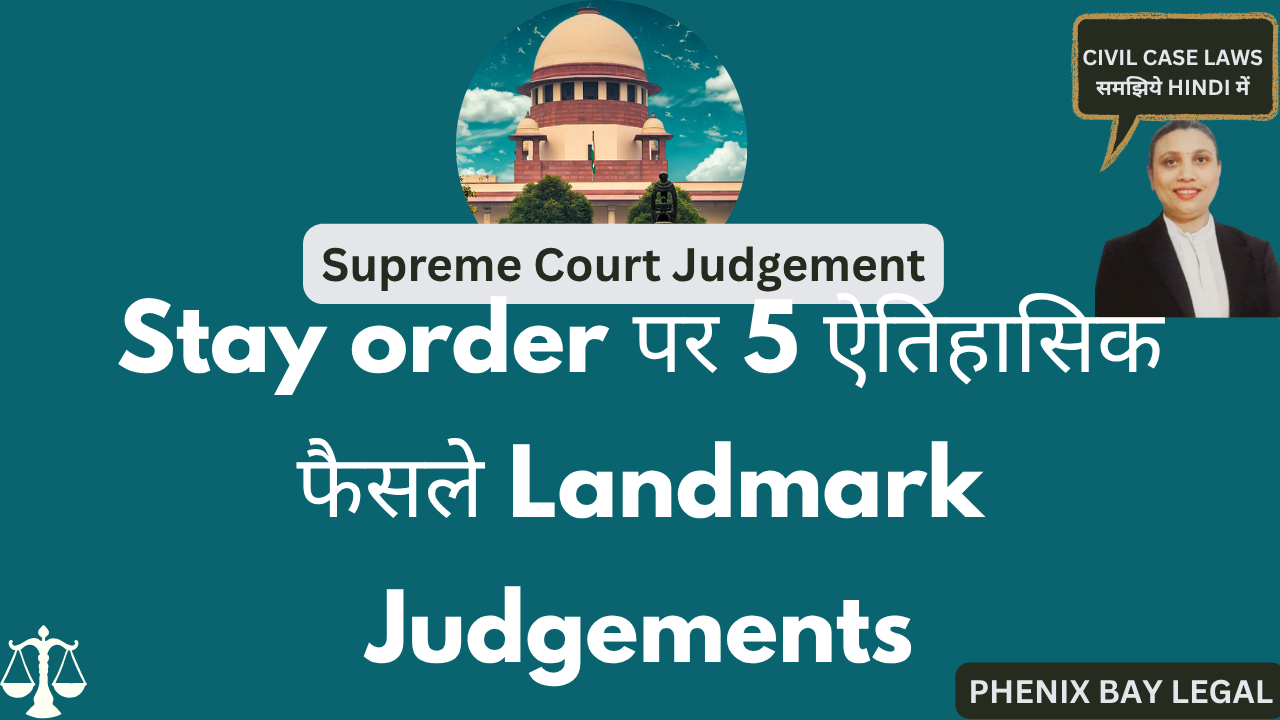
Landmark Judgement on Injunction
In civil, commercial, or even family disputes. But when is a simple injunction suit enough? When do you need to add a declaration of title? And how do courts balance urgency vs evidence in interim relief?
- Krushna Chandra Behera & Ors. v. Narayan Nayak & Ors. (2025)
Citation: Civil Appeal No. 159 of 2025
Judgment Date: 4 January 2025
Core Issue:
Can a suit for injunction simpliciter (injunction without seeking title declaration) be maintained if the defendant does not contest the title?
Facts:
The plaintiff sought a permanent injunction to restrain interference with land possession. Both the trial and appellate courts ruled in his favour. However, the High Court dismissed the case, holding that title must also be claimed.
Supreme Court's Ruling:
It held that if the title is not genuinely disputed, a suit purely for injunction is maintainable. It relied on Anathula Sudhakar (2008) and clarified that a declaration is required only when title is contested.
Why It Matters:
This decision protects plaintiffs from unnecessary delays and avoids technical dismissal of suits meant to stop interference.
Issue: Can you file a suit just for injunction without declaration of title?
📍Facts: Plaintiff in possession sought to restrain defendants from interfering. High Court said the suit wasn’t maintainable without title declaration.
📍SC’s Decision:
✔️ If the defendant doesn't dispute the title or possession, suit for injunction simpliciter is maintainable.
✔️ High Court went wrong by assuming title was in dispute without evidence.
📍Principle: Reaffirms Anathula Sudhakar — if title is undisputed and plaintiff is in possession, no need to file for declaration.
📍Takeaway for students: Always check if there’s a real dispute over title or possession — that determines the nature of suit you file.
🔗 Full Judgment – Indian Kanoon
- Dalpat Kumar & Anr. v. Prahlad Singh & Ors. (1992)
Citation: (1992) 1 SCC 719
Core Issue:
What are the key principles for granting temporary injunctions under Order 39 Rules 1 & 2 of CPC?
Facts:
There was a property sale dispute where one party sought interim relief. The High Court granted it without applying legal standards properly.
Supreme Court's Ruling:
Introduced the "Three Golden Principles":
- Prima Facie Case
- Irreparable Injury
- Balance of Convenience
Held that interim relief must not be granted casually. Courts must balance both parties' hardship.
Why It Matters:
This case forms the backbone of how courts assess interim injunctions even today.
📍Issue: What are the rules for granting temporary injunction?
📍SC Laid Down Three Golden Rules:
- Prima Facie Case – Looks like the applicant has a valid legal claim.
- Irreparable Injury – Harm that can’t be compensated by money.
- Balance of Convenience – Granting injunction causes less harm than refusing it.
📍Significance: These rules are still followed today in every civil court when deciding interim injunctions.
📍Tip for Young Lawyers: Always include these three grounds in your application under Order 39 Rules 1 and 2 CPC. Don’t miss them.
🔗 Full Judgment – Indian Kanoon
- Anathula Sudhakar v. P. Buchi Reddy (2008)
Citation: (2008) 4 SCC 594
Core Issue:
When is it sufficient to file a suit for injunction only, and when should a declaration of title or possession be added?
SC’s Framework:
- If possession is clear & title not disputed → injunction is enough.
- If title is disputed → suit must include declaration.
- If not in possession → must file for possession + injunction.
Why It Matters:
This case is a go-to guide for property lawyers. It prevents abuse of procedure and ensures the correct form of relief is chosen.
📍Issue: When is a simple injunction enough? When must you file for declaration too?
📍SC’s Categorization:
- In possession + title not disputed ➤ Injunction sufficient.
- In possession + title disputed ➤ Suit must be for declaration + injunction.
- Not in possession + title undisputed ➤ File for possession + injunction.
- Not in possession + title disputed ➤ File for declaration + possession + injunction.
📍Impact: This case gives the framework for deciding how to file property disputes.
📍Student Tip: Before filing, examine if title is in cloud or uncontested — don’t skip this analysis in real cases.
🔗 Full Judgment – Indian Kanoon
- Balram Singh v. Kelo Devi (2022)
Citation: 2022 SCC OnLine SC 1239
Core Issue:
Can a party seek permanent injunction based on an unregistered agreement to sell?
Facts:
Plaintiff claimed protection based on possession through an unregistered sale agreement. The lower courts granted relief.
Supreme Court’s View:
Reversed the decision. Held that unregistered agreements cannot be the sole basis to claim injunction. You can't get an injunction if you can't prove title or lawful possession.
Why It Matters:
This case blocks misuse of unregistered documents and underlines the need for proper documentation in property deals.
📍Issue: Can a permanent injunction be granted based on an unregistered agreement to sell?
📍Facts: Plaintiff claimed possession via unregistered agreement to sell and wanted to stop defendant from interfering.
📍SC held:
❌ You cannot base a suit for injunction solely on an unregistered document unless it's used collaterally.
❌ You can’t bypass specific performance suit by filing just for injunction.
📍Key Learning:
🛑 Don’t rely only on unregistered agreements to claim possession rights.
🛑 Registration is key if you want substantive rights.
📍Practical Tip: Always get property agreements registered, especially if you’re going to court to protect possession.
🔗 Full Judgment – Indian Kanoon
- Gujarat Bottling Co. Ltd. v. Coca Cola Co. (1995)
Citation: AIR 1995 SC 2372; (1995) 5 SCC 545
Core Issue:
Are negative covenants (not to compete with a party during contract) legally enforceable?
Facts:
Coca-Cola sued Gujarat Bottling for breaching their exclusive bottling contract and trying to partner with Pepsi.
SC Ruling:
Negative covenants during the term of a contract are not in restraint of trade. Injunctions can be granted to enforce them.
Why It Matters:
This case is vital in commercial contract law, supporting exclusive arrangements and protection from business sabotage.
📍Issue: Can courts enforce negative covenants through injunctions?
📍Facts: Coke’s franchisee (GBC) agreed not to deal with competing products. GBC then tied up with Pepsi.
📍SC Held:
✔️ Negative covenants during contract period are valid and not a restraint of trade.
✔️ Interim injunctions can protect such business interests if balance of convenience favors it.
📍Rule: Section 27 of the Indian Contract Act allows reasonable restrictions during a contract, not necessarily after.
📍Tip: Commercial contracts with exclusivity clauses can be enforced with injunctions if drafted properly.
🔗 Full Judgment – Indian Kanoon
Injunctions are not just temporary band-aids — they’re often the first shield in civil litigation.
These 5 cases will help you:
- Understand when a simple injunction works
- Know when to go for title declaration
- Master the 3-point test for interim injunctions
- Avoid pitfalls with unregistered documents
- Enforce business contracts with strategic clauses”
“Remember — pleadings matter, evidence matters more. Draft like a litigator, argue like a strategist.”
More >>

Jyoti Sharma vs. Vishnu Goyal & Anr. 2025 INSC 1099
This was a long running legal battle between a landlord and her tenants over a shop. The landlord, Jyoti Sharma, wanted her shop back for two main reasons: The tenants had stopped paying rent. She needed the shop to expand her family's business (her bonafide need).

Landmark Judgement on Injunction
In civil, commercial, or even family disputes. But when is a simple injunction suit enough? When do you need to add a declaration of title? And how do courts balance urgency vs evidence in interim relief?
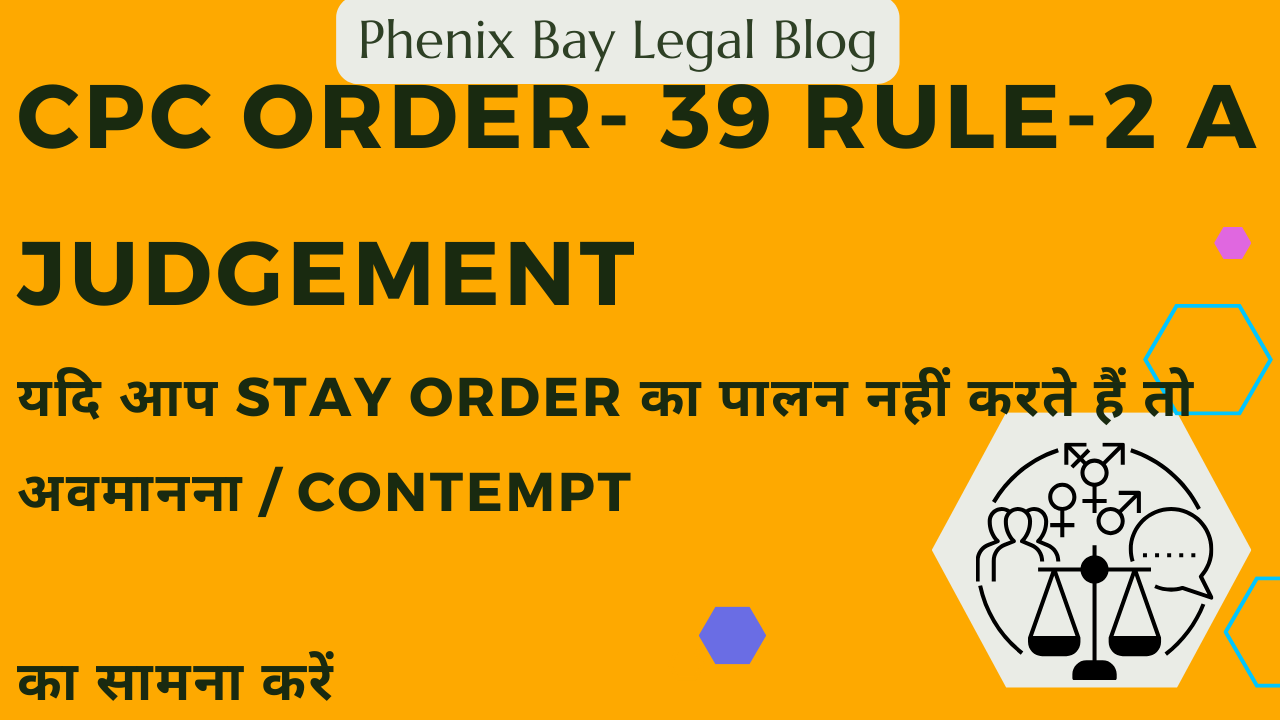
Case Analysis: Stay Order Violation and Contempt of Court by Supreme Court of India
Giving an undertaking to the court is equivalent to an order of injunction—any violation invites contempt proceedings.Injunction orders remain valid until formally vacated by a court—violation before vacation can lead to punishment.
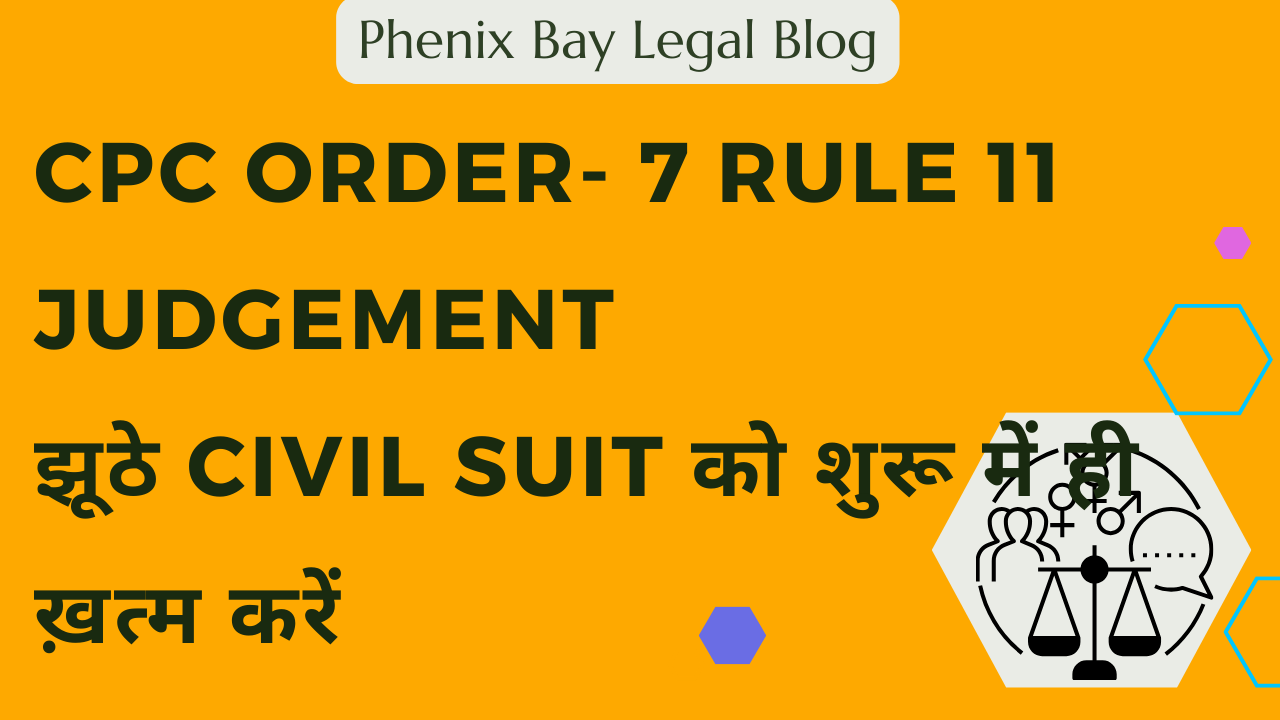
Order 7 Rule 11 of CPC Explanation in Land Mark Judgement
The Sopan Sukhdeo Sable judgment is a landmark ruling that reinforces Order 7 Rule 11 of CPC as a safeguard against frivolous and legally untenable claims. It highlights the importance of examining only the plaint’s contents to decide whether a suit should be dismissed at the threshold.
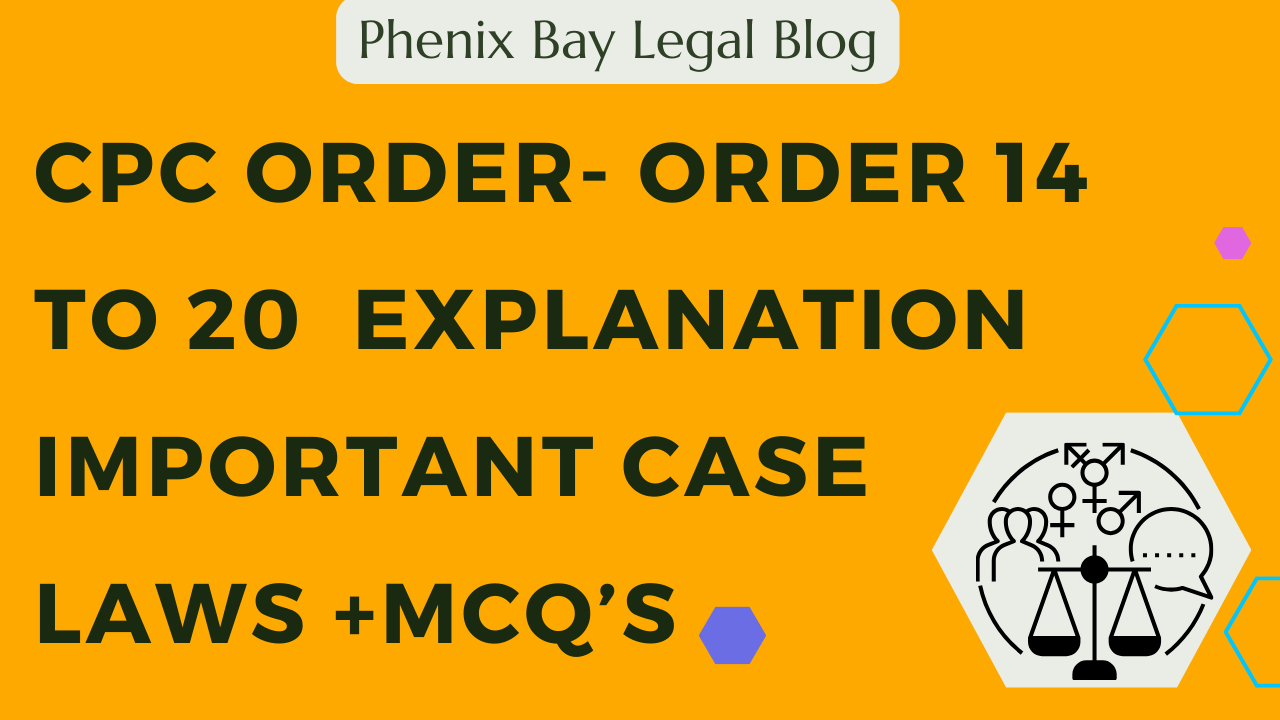
CPC Order- Order 14 to 20 Explanation IMPORTANT CASE LAWS +MCQ’S for Judiciary Exam Preparation
CPC Order- Order 14 to 20 Explanation IMPORTANT CASE LAWS +MCQ’S for Judiciary Exam Preparation
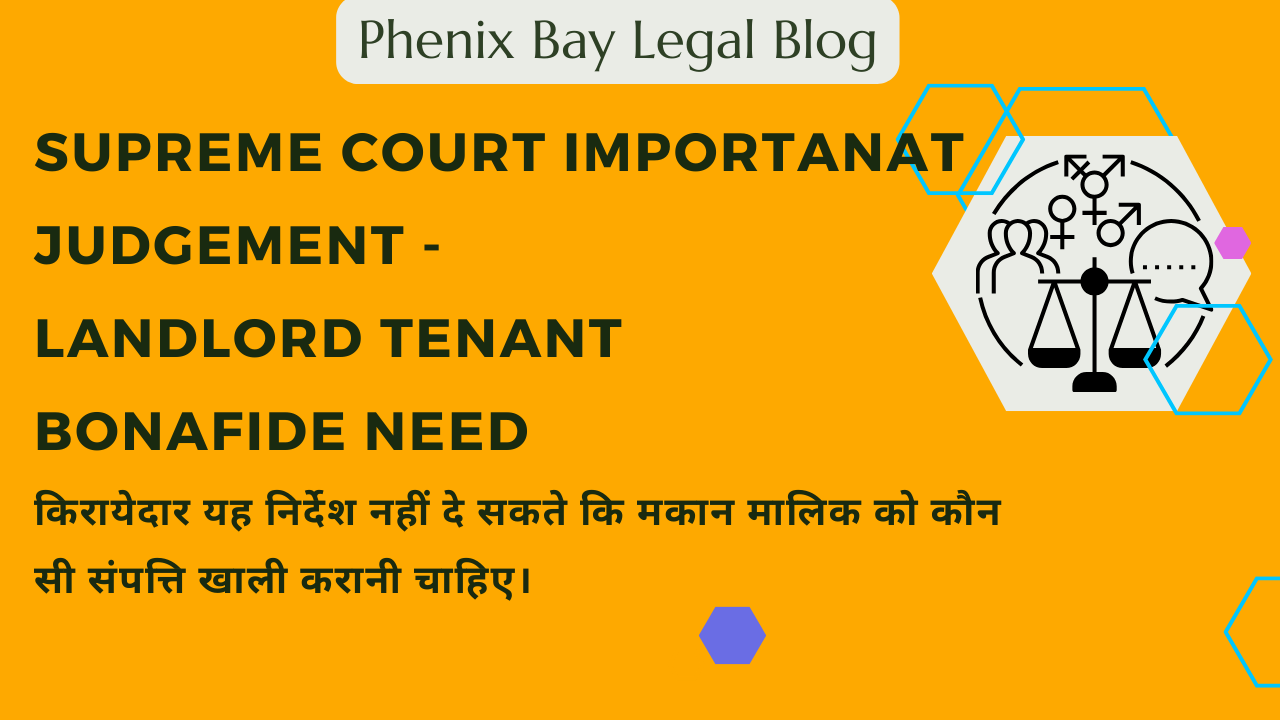
Supreme Court ImportanatJudgement - Landlord Tenant Bonafide need
This case involves a dispute over eviction of a tenant based on the bona fide need of the landlord. The Supreme Court ruled in favor of the landlord, reversing the High Court's decision. Below is a detailed breakdown of the judgment with relevant legal principles, precedents, and reasoning.